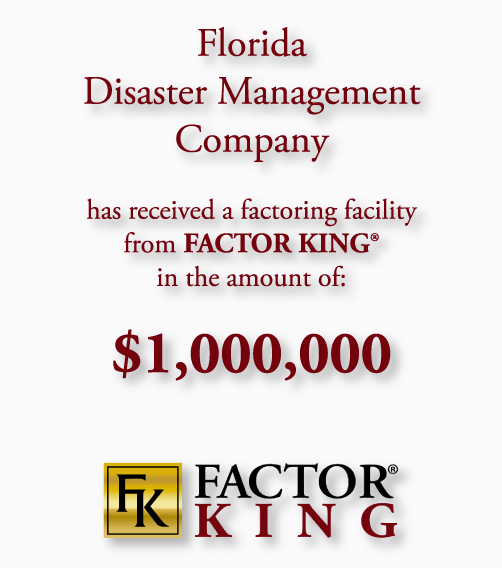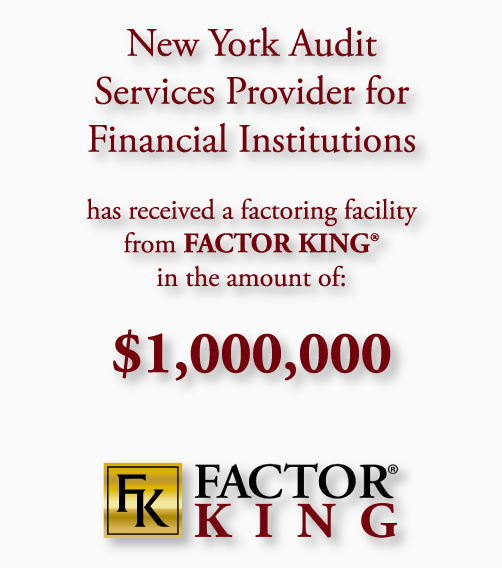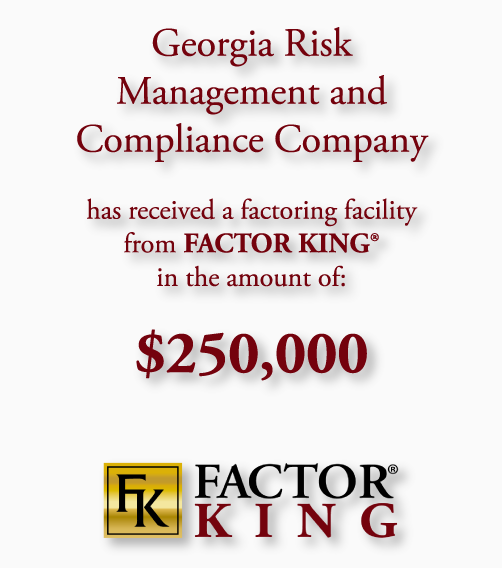Factoring Company- Glossary > Factoring Terms (165 entries)

Search the FAQ for entries containing:
-
A system of the U.S. Federal Reserve Bank that provides electronic funds transfer (EFT) between banks. It is used for all kinds of fund transfer transactions, including direct deposit of paychecks ...
-
These consumers have less than perfect to bad credit and usually cannot qualify for traditional financing. Also called sub-prime credit customers.
-
This is the amount that a factoring company will write off in the event that an account does not pay their invoices. In some factoring relationships the business who sold the ...
-
A reserve of funds held back by a factor when purchasing invoices to offset its losses in the event of non-payment. Once the reserve reaches a predetermined size sufficient to protect ...
-
Any debt that is delinquent and has been written off as uncollectible.
-
A financial report that shows what an individual, business, or other entity owns (its assets), what it owes (its liabilities), and the amount of its net worth or equity.
-
The balance of principal that is due and owing in its entirety at a specified point in time, but in any event, less than the time required to fully amortize the ...
-
Bankruptcy refers to statutes and judicial proceedings involving persons or businesses that cannot pay their debts and seek the assistance of the court in getting a fresh start.
-
Bill of Exchange is an unconditional order in writing, signed by a drawer such as a buyer, and addressed to the drawee, typically a bank, ordering the drawee to pay a ...
-
A shipping document which gives instructions to the company transporting the goods.
-
A document used to transfer the title of certain goods from seller to buyer.
-
Blanket Assignment is a legal transfer of ownership of all accounts receivable, both present and future as collateral for funding.
-
Cash flow instruments that are paid to a business by another business or government.
-
Capital Net Worth is the amount by which total assets exceed total liabilities. Also known as shareholder’s equity or book value, capital net worth is what would be left over for ...
-
The buying, selling, and brokering of privately held debt in the secondary marketplace; the marketplace where businesses and individuals get help managing their cash flow needs.
-
Future payment or series of payments. Also called a debt instrument or income stream.
-
Occurs whenever a funding source pays cash to an individual or business in exchange for an income stream.
-
Cash flow is the measurement of cash a company gained or lost during an accounting period and adjusted for any previous accounting for accruals and other non-cash transactions. Since money does ...
-
A mortgage on personal property, given to secure a debt. Typically used in the sale of a business. Also called a security agreement.
-
The client also referred to as the ‘account creditor’ in a factoring relationship is the company that is in need of cash and wants to sell its receivables to the factor. ...
-
Cash flow instruments that are secured by collateral.
-
Something of value (land, a home, a car, etc.) that is pledged as security to ensure the payment of a debt. Collateral is promised to a lender until a loan is ...
-
Refers to the funding source's ability to collect future income stream payments once they are purchased.
-
Commercial Credit Insurance is insurance against large losses from the uncollectability of accounts receivable.
-
Concentration is the amount of one client's accounts receivable due from a single customer. A large concentration for a single customer is considered high risk.
-
Confidential Invoice Discounting relates to a company entering into a factoring arrangement whereby the sales ledger function remains fully with the company. All credit control functions are the companies responsibility and ...
-
Cash flows in which the party that owes payments is a consumer, a private individual.
-
Cash flows in which the recipient is not necessarily legally entitled to receive payments, or in which the amount of the payment is uncertain or contingent upon outside factors.
-
The process of converting a qualified prospect into an active client.
-
A corporate resolution is a legal document that will be voted on or has been voted on at a meeting of the board of directors for a corporation. The resolution could ...
-
Rules governing the internal management of an organization, which in the case of business corporations are drawn up at the time of incorporation.
-
A legal entity, chartered by a U.S. state or the federal government, and separate and distinct from the persons who own it. It is regarded by the courts as an artificial ...
-
The cost of all the materials needed to make the client's product.
-
The process of analyzing the records and financial affairs of a business to determine creditworthiness.
-
Credit Insurance if your customer fails to pay the invoice. You receive payments for your bad debts up to pre determined limits.
-
The extending of time in relation to when payment is required in return for product or services provided.
-
One who is owed payments on a debt by a debtor.
-
The client's customers (recipients of the client's products or services) who are responsible for payment of an invoice. Customers are also referred to as payors or account debtors.
-
Abbreviation for "Doing Business As".
-
DBT or days beyond terms indicates how many days past the due date an invoice is late.
-
Future payment or series of payments, or a debt that one party owes to another party. Also known as income streams or cash flow instruments.
-
The party that owes something and makes payment to a creditor.
-
The omission or failure to perform or fulfill a legal duty, obligation, or promise (i.e. to pay a debt).
-
Documentary proof that shipment of goods invoiced as sales has occurred.
-
The amount of risk associated with collection of the accounts receivable including but not limited to returns, charge-backs, trade allowances, concentrations, slow pay, and bad debt.
-
Discount Factoring refers to an arrangement whereby a factor purchases an account(s) receivable from a business at a discount to the face value of that receivable. The factor earns a fee ...
-
The amount earned by a factor on each invoice purchased. Discount fee is based on the period of time the invoice remains outstanding (unpaid) and is set forth and agreed upon ...
-
The percentage of the face amount of an invoice that a factor keeps or charges as its fee for factoring and other services. Also called the factor's fee.
-
The percentage of the face value of an invoice that a factor holds as its fee.
-
The process through which consultants and funding sources assess the risk and authenticity of a deal. It consists of the gathering and verification of information and documentation necessary for the funding ...
-
The system by which money documents, personal property, or real property is held in trust for another party by a disinterested third party until the terms and conditions of the escrow ...
-
The transfer of money from one account to another by computer. See ACH.
-
Face Amount or Face Value is the total amount of an invoice. Face value is the amount that has to be paid to the factor by client's customer, without consideration as ...
-
Factor, as a noun is a company engaged in the buying of accounts receivable. Factor, as a verb is the act of buying or selling accounts receivable at a discount.
-
The total fee charged for purchasing the invoices or accounts receivable.
-
The process that a factoring company enables to verify that products and services were in fact delivered to the company being charged an invoice to prior to purchasing the asset.
-
A form of accounts receivable (invoice) financing involving the sale of accounts receivable to a factoring company either with or without recourse. Factoring can be on a notification or non-notification basis. ...
-
A form sent to the client's customer by the factor, confirming that the client's invoice does exist and that the customer will remit the payment due under that invoice to the ...
-
The money the factor sends to the client up front, after the verification process is complete, and before the factor receives its money from the client's customer. The advance is figured ...
-
An amount of money that is owed to the factor and is deducted or Charged-Back from the reserve or availability of the line due to an agreed upon non-payment by debtor ...
-
Refers to the business that is selling its accounts receivable to a factoring agent or organization.
-
The amount of money released from the Factors Reserve once payment has been received and credited. The Reserve Release may be less any charge-back or fees associated with the services.
-
A deposit maintained by the factor, to guard against disputes between the client and the customer, and to guard against bad debt losses due to customer non-payment. This is the money ...
-
Services provided by the factoring agent to the client on behalf of the factoring process, such as credit analysis, credit guarantees and collection management.
-
Refers to the process whereby a factor verifies that the goods and services represented as provided and invoiced by the client to the customer, were in fact provided and accepted, and ...
-
A legal statement filed when a person uses a name other than his or her own to operate a business.
-
Costs that remain constant over a wide range of volume.
-
Overhead; expenses that will not change regardless of sales volume.
-
A legal proceeding in court to seize property given as security for a debt that is in default.
-
The factor is protected in the event that a customer does not pay their invoice. If this occurs, the customer is responsible for full re-payment of the advanced funds to the ...
-
An individual investor or an investment company that buys income streams.
-
The advance of monies based on the sale of invoices to a factor.
-
Cash flows paid by a government entity, either directly or through an insurance company.
-
Guaranteed Sales is a term used for sales that allow the return of merchandise purchased at the customer's discretion.
-
Borrowing funds from a lender, investing those funds in a debt instrument, and giving the lender a security interest in the debt instrument as the collateral for the loan.
-
A future payment or series of payments, or a debt that one party owes to another party. Also known as a debt instrument or cash flow instrument.
-
Indemnification is a promise to compensate for loss or damage sustained as a result of a stated set of circumstances.
-
The length of time for which the initial fee is charged. Although it may vary the length of time corresponds with the terms of the receivable. If the terms are Net ...
-
Also referred to as the ‘discount fee’, is the fee charged by the Factor on each invoice making up an advance. The initial fee is a fixed percent of each invoice ...
-
Savings and loan associations, local and regional banks, mortgage companies, finance companies, and commercial lenders.
-
Cash flows stemming from insurance companies and paid to individuals or businesses.
-
Something that has value but is not a tangible asset, for example, a trademark, copyright, patent, or trade secret.
-
The rate paid on money that is borrowed, usually stated as percentage rate per year (factoring does not involve charging interest).
-
A measure of how secure a creditor's position is and how likely the creditor is to recoup all of his or her money in the event of a foreclosure.
-
Invoice Discounting is instant cash upon issuing invoices without sales ledger and collection services required.
-
Invoice Finance is another phrase for factoring and invoice discounting.
-
Invoice is a legal debt instrument which indicates the amount due from a customer to pay for delivered goods and/or services.
-
Generally businesses in need of receivables financing from $750,000 to $3 million.
-
This is the length of time or any portion thereof for which a late fee is charged. If the initial period is 30 days and the late fee period is 15 ...
-
This is the fee charged by the factor for each late period for which an account receivable is outstanding beyond the initial fee period.
-
The ratio of debt to total assets.
-
A financial obligation, debt, claim or potential loss. Usually debt on terms of less than five years is called short-term liabilities, and debt for longer than five years in long-term liabilities. ...
-
Lien Search refers to a search through public records on file in both the County Clerk's and Secretary of State's offices for any claims (pledges) against the property of a business ...
-
A hold or claim that one person or entity has upon the property of another as security for repayment of a debt. When the debt is paid, the lien is removed. ...
-
A form of business structure designed to combine the best of corporate and partnership attributes into one entity.
-
Line of Credit is the amount of credit that may be extended to a borrower by a lender. This type of arrangement gives a borrower more flexibility in planning for operating ...
-
Liquidity is a company’s ability to meet current obligations with cash or other assets that can be quickly converted to cash. Liquidity is one of the most important characteristics of a ...
-
This is a PO Box maintained by the factor at the factor’s bank to expedite the collection and processing of payments sent by customers to pay invoices. All payments of invoices ...
-
Consumers who may have had some slow pay problems, but generally pay their bills.
-
The price at which a ready, willing, and informed person would buy something; the price property would command in the current market.
-
A lien created by statute for the purpose of securing priority of payment for the price or value of work performed and materials furnished in construction or repair of improvements to ...
-
Generally medium businesses are those requiring receivables financing from $150,000 to $750,000.
-
Negative Cash Flow refers to a situation where income is less than expenses. Prolonged negative cash flow can lead to the failure of a business.
-
In this type of factoring, the customer or account debtor is unaware of the factor purchasing the client invoice. They are however, directed to make payment to a lock box controlled ...
-
Non-Notification is an aspect of confidential factoring where the customers are not notified of the client's arrangement with the factor.
-
Non-Recourse is a type of factoring where the factor assumes complete responsibility for collection of debt. If the debt is not collected due to the financial inability of the customer, the ...
-
This is a written promise to pay a named amount to a particular company or business by a certain date.
-
A document notifying the owner of real property that materials or services are being furnished to his real property, putting him on notice that the one sending it will look to ...
-
Notification is a process whereby the factor lets an account debtor know that an invoice has been purchased from the client and that the debtor is to pay the factor directly. ...
-
The costs of a business that are not directly associated with production or sale of goods or services. Also call indirect costs, fixed costs, or expenses.
-
A type of financing in which the seller of a tangible item accepts a promissory note as a portion of the purchase price. Also called seller financing.
-
Any part of a payment stream that is less than the full amount due.
-
Person or business that has the right to receive a payment or series of payments and is interested in selling that income stream for cash. (Also called the seller or client.) ...
-
The person, company, or government responsible for making payments on an income stream.
-
A contractual agreement between a funding source and a seller, whereby the seller assumes personal responsibility and liability for the obligations of the income stream.
-
A group or package of income streams of the same type
-
Pre-ship Invoice refers to a legal debt instrument which indicates the amount due from a customer to pay for goods or services which have not yet been delivered. Generally, factors would ...
-
A penalty for the payment of a debt before it becomes due.
-
Principal Generally is a major party to a transaction, acting as either a buyer or seller or the owner of a privately held business.
-
Principal is a term used for the owner of a privately held business or one of the main parties (buyer or seller) involved in a transaction.
-
Owed to a private individual or business rather than to a bank or other financial institution.
-
Summary of the revenues, costs and expenses of a company during an account period; also called income statement, operating statement, statement of profit and loss, income and expense statement.
-
A written promise to pay a specified amount to a specified party over a certain period of time.
-
This refers to the assignment of purchase orders to a third party who then assumes the obligation of billing and collecting. Typically, this form of financing is tied to a specific ...
-
Purchase order is a contractual agreement with a supplier of goods or services that specifies payment terms, delivery dates, item identification, quantities, freight terms and all other obligations and conditions.
-
Quantity Discounts are discounts that are offered to encourage customers to buy in larger amounts.
-
Rate of Return is the gain or loss generated from an investment over a specified period of time. Rate of return is also referred to as total return and it includes ...
-
Rebate is the return of funds issued to the client by a factor from the reserve account.
-
A remedy that may be granted by a court of law in an appropriate case, whereby a person is appointed as a receiver to possess, manage, and protect money or property ...
-
A review of financing statements or liens on file with the Secretary of State and/or County Clerk; discloses any existing pledge of a business's account receivable, inventory, or machinery and equipment. ...
-
Factoring where the funding source purchases receivables and withholds a reserve in case of non-paym
-
This is the length of time in which factor will fund a purchased account receivable before the factor will return a non-performing or unpaid account receivable to the client.
-
In this type of factoring, the risk of customer non-payment remains with the client. If the client's customer is financially unable to pay the money due under the invoice, the factor ...
-
A legal proceeding in court to seize property (other than real estate) given as security for a debt that is in default.
-
The account set up to track funds owed to the client from the collection of factored invoices. The reserve account balance can be calculated by taking the invoice face value and ...
-
The process of the factor releasing final monies due the client once the invoice has been totally satisfied less any applicable fees or charge-backs.
-
Refers to the amount withheld by the factor net of the advance. Can be used as a financial cushion to protect against shortages, disputes between the client and the customer or ...
-
A right that exists between two parties, each of whom owes an amount to the other under a separate contract, to set-off (reduce) one party's debt by deducting therefrom the amount ...
-
The discharge of an obligation by paying a party what is due (i.e., the satisfaction of an IRS lien or the satisfaction of a mortgage).
-
A document provided to the factor by the client that lists the following information: the date of the client's invoice, account number assigned to the customer by the client, name of ...
-
The length of time payments have been made on a note or other debt instrument.
-
The marketplace where individuals and businesses can sell privately held income streams to funding sources for cash.
-
An interest in property, other than real estate, which is given as security for a debt or other obligation. A security interest is created by execution of a security agreement and ...
-
Security is the property given or pledged to ensure the repayment of a debt by a borrower.
-
The person or company that is holding a debt instrument and wants to sell it.
-
The collection of payments of interest and principal, and trust fund items such as fire insurance, taxes, etc., on a note by the borrower in accordance with the terms of the ...
-
An agreement established between the client and his customer, whereby in certain circumstances the customer may be entitled to deduct a portion of the amount otherwise owed the client, in which ...
-
An agreement established between the client and his customer, whereby in certain circumstances the customer may be entitled to deduct a portion of the amount otherwise owed the client, in which ...
-
Small businesses are considered small when receivables financing is needed from $5,000 to $150,000 monthly.
-
A business owned and operated by an individual.
-
The act of a creditor acknowledging in writing that a debt due him or her by a debtor shall be inferior to the debt due another creditor by the same debtor. ...
-
This is the document(s) that make invoice(s) accounts receivable ( i.e. proof of delivery, time cards, acceptance signature, etc..) In simple terms, the paperwork that the customer needs to pay the ...
-
The payment stream and/or balloon payment of an income stream subsequent to another party's right and interest in the income stream. Usually the back half of the payment stream when another ...
-
Personal property other than real estate, such as cars, boats, or other assets.
-
The period of duration of an invoice, acceptance, time draft, bill of exchange, or bond; synonymous with tenor and usance. The time allowed for payment of bills.
-
Concept that addresses the way the value of money changes over a period of time.
-
Trade Discount is a deduction from the list price of goods provided by a business in return for payment within a specified time frame.
-
A spreadsheet that lists all loans in a portfolio and their payment schedule. Usually required for a portfolio transaction.
-
A document that is placed on record with the Secretary of State or with the county recording office. The purpose of filing this document is to evidence the funding source's security ...
-
A document commonly used in the State of California, also filed with the Secretary of State. The State of California does not have a UCC-3 document; they call it a UCC-2. ...
-
A document that is placed on record with the Secretary of State or with the county recording office to evidence a change in status for a UCC-1. With respect to cash ...
-
Uniform Commercial Code is a set of standard rules, adopted by states in US, that governs commercial transactions. The Uniform Commercial Code Bureau files and maintains record on financial obligations (including ...
-
A lease or note that has had few, if any, payments made.
-
Verification is a step during the due diligence process in which a factor confirms the validity of an invoice with the customer.
-
The amount of money that a business has available to conduct it's day-to-day activities. It includes monies that that the owner or investors have invested in the company, retained earnings and ...






































